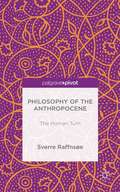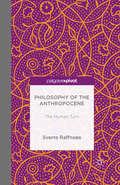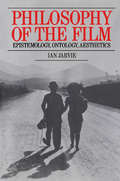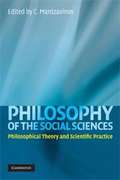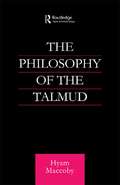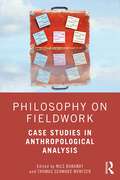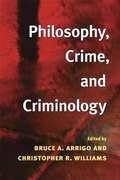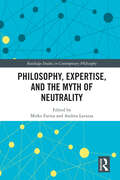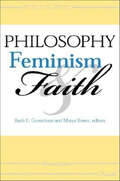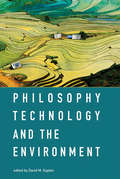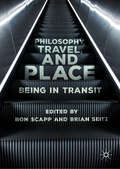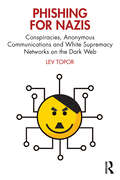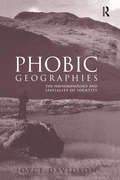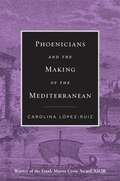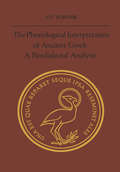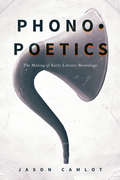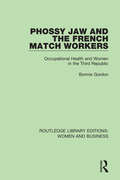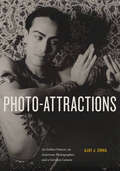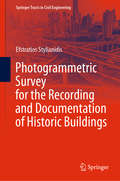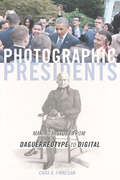- Table View
- List View
Philosophy of the Anthropocene: The Human Turn
by Sverre RaffnsøeThe Anthropocene is heralded as a new epoch distinguishing itself from all foregoing eons in the history of the Earth. It is characterized by the overarching importance of the human species in a number of respects, but also by the recognition of human dependence and precariousness. A critical human turn affecting the human condition is still in the process of arriving in the wake of an initial Copernican Revolution and Kant's ensuing second Copernican Counter-revolution.Within this landscape, issues concerning the human - its finitude, responsiveness, responsibility, maturity, auto-affection and relationship to itself - appear rephrased and re-accentuated as decisive probing questions. In this book Sverre Raffnsøe explores how the change has ramifications for the kinds of knowledge that can be acquired concerning human beings and for the human sciences as a study of human existential beings in the world.
Philosophy of the Film: Epistemology, Ontology, Aesthetics
by Ian JarvieExamines the overlap between film and philosophy in three distinct ways: epistemological issues in film-making and viewing; aesthetic theory and film; and film as a medium of philosophical expression.
Philosophy of the Home: Domestic Space and Happiness
by Emanuele CocciaA bedroom, a kitchen, a bathroom - are these rooms all that make a home? Not at all, argues Emanuele Coccia. The buildings we inhabit are of immense psychological and cultural significance. They play a decisive role in human flourishing and, for hundreds of years, their walls and walkways, windows and doorways have guided our relationships with others and with ourselves. They reflect and reinforce social inequalities; they allow us to celebrate and cherish those we love. They are the places of return that allow us to venture out into the world.In this intimate, elegantly argued account, Coccia shows how the architecture of home has shaped, and continues to shape, our psyches and our societies, before then masterfully leading us towards a more creative, ecological way of dwelling in the world.
Philosophy of the Social Sciences: Philosophical Theory and Scientific Practice
by C. MantzavinosThis volume is a unique contribution to the philosophy of the social sciences, presenting the results of cutting-edge philosophers' research alongside critical discussions by practicing social scientists. The book is motivated by the view that the philosophy of the social sciences cannot ignore the specific scientific practices according to which social scientific work is being conducted, and that it will be valuable only if it evolves in constant interaction with theoretical developments in the social sciences. With its unique format guaranteeing a genuine discussion between philosophers and social scientists, this thought-provoking volume extends the frontiers of the field. It will appeal to all scholars and students interested in the interplay between philosophy and the social sciences.
Philosophy of the Talmud (Routledge Jewish Studies Series)
by Hyam MaccobyThis is a new presentation of the philosophy of the Talmud. The Talmud is not a work of formal philosophy, but much of what it says is relevant to philosophical enquiry, including issues explored in contemporary debates. In particular, the Talmud has original ideas about the relation between universal ethics and the ethics of a particular community. This leads into a discussion on the relation between morality and ritual, and also about the epistemological role of tradition. The book explains the paradoxes of Talmudic Judaism as arising from a philosophy of revolution, stemming from Jewish origins as a band of escaped slaves, determined not to reproduce the slave-society of Egypt. From this arises a daring humanism, and an emphasis on justice in this world rather than on other-worldly spirituality. A strong emphasis on education and the cultivation of rationality also stems from this. Governing the discussion is a theory of logic that differs significantly from Greek logic. Talmudic logic is one of analogy, not classification and is peculiarly suited to discussions of moral and legal human situations. This book will be of interest to those in the fields of philosophy, religion and the history of ideas, whether students, teachers and academics, or the interested general reader.
Philosophy on Fieldwork: Case Studies in Anthropological Analysis
by Nils BubandtHow do we teach analysis in anthropology and other field-based sciences? How can we engage analytically and interrogatively with philosophical ideas and concepts in our fieldwork? And how can students learn to engage critical ideas from philosophy to better understand the worlds they study? Philosophy on Fieldwork provides "show-don’t-tell" answers to these questions. In twenty-six "master class" chapters, philosophy meets anthropological critique as leading anthropologists introduce the thinking of one foundational philosopher – from a variety of Western traditions and beyond – and apply this critically to an ethnographic case. Nils Bubandt, Thomas Schwarz Wentzer and the contributors to this volume reveal how the encounter between philosophy and fieldwork is fertile ground for analytical insight to emerge. Equally, the philosophical concepts employed are critically explored for their potential to be thought "otherwise" through their frictional encounter with the worlds in the field, allowing non-Western and non-elite life experience and ontologies to "speak back" to both anthropology and philosophy. This is a unique and concrete guidebook to social analysis. It answers the critical need for a "how-to" textbook in fieldwork-based analysis as each chapter demonstrates how the ideas of a specific philosopher can be interrogatively applied to a concrete analytical case study. The straightforward pedagogy of Philosophy on Fieldwork makes this an accessible volume and a must-read for both students and seasoned fieldworkers interested in exploring the contentious middle ground between philosophy and anthropology.
Philosophy, Crime, and Criminology (Critical Perspectives in Criminology)
by Christopher R. Williams Bruce A. ArrigoPhilosophy, Crime, and Criminology represents the first systematic attempt to unpack the philosophical foundations of crime in Western culture. Utilizing the insights of ontology, epistemology, aesthetics, and ethics, contributors demonstrate how the reality of crime is informed by a number of implicit assumptions about the human condition and unstated values about civil society. Charting a provocative and original direction, editors Bruce A. Arrigo and Christopher R. Williams couple theoretically oriented chapters with those centered on application and case study. In doing so, they develop an insightful, sensible, and accessible approach for a philosophical criminology in step with the political and economic challenges of the twenty-first century. Revealing the ways in which philosophical conceits inform prevailing conceptions of crime, Philosophy, Crime, and Criminology is required reading for any serious student or scholar concerned with crime and its impact on society and in our lives.
Philosophy, Expertise, and the Myth of Neutrality (Routledge Studies in Contemporary Philosophy)
by Andrea Lavazza Mirko FarinaThis volume offers a new framework for understanding expertise. It proposes a reconceptualization of the traditional notion of expertise and calls for the development of a new contextual and action-oriented notion of expertise, which is attentive to axiological values, intellectual virtues, and moral qualities.Experts are usually called upon, especially during times of emergency, either as decision-makers or as advisors in formulating policies that often have a significant impact on society. And yet, for certain types of choices, there is a growing tension between experts’ recommendations and alternative views. The chapters in this volume critically assess the idea of whether possessing epistemic authority can automatically make someone’s assertions necessarily more grounded than others. They not only evaluate the epistemological implications of this idea but also reflect on its ethical, socio-cultural, and political consequences. The interdisciplinary framework advanced across the chapters seeks to overcome certain limitations that underlie current models of expertise by adopting more inclusive and representative decisions that can improve the perceived neutrality of experts’ decisions. Increasing neutrality means reducing cases in which an unidentified bias – be it a scientific one or not – puts any of the individuals involved in a specific public choice at a systematic disadvantage.Philosophy, Expertise, and the Myth of Neutrality will appeal to scholars and advanced students working in epistemology, philosophy of science, philosophy of the social sciences, public policy, and sociology.
Philosophy, Feminism & Faith (Philosophy of Religion)
by Marya Bower Ruth E. Groenhout"The stories are powerful, sometimes heart-rending, sometimes lyrical, but always deeply personal. And there is some very good philosophizing as part of the bargain." —Merold WestphalHow can the seemingly separate lives of philosopher, feminist, and follower of a religious tradition come together in one person's life? How does religious commitment affect philosophy or feminism? How does feminism play out in religious or philosophical commitment? Wrestling with answers to these questions, women who balance philosophy, feminism, and faith write about their lives. The voices gathered here from several different traditions—Catholic, Protestant, Quaker, Jewish, and Muslim—represent diverse ethnicities, races, and ages. The challenging and poignant reflections in Philosophy, Feminism, and Faith show how critical thought can successfully mesh with religious faith and social responsibility.
Philosophy, Technology, and the Environment (The\mit Press Ser.)
by David KaplanContributions by prominent scholars examining the intersections of environmental philosophy and philosophy of technology.Environmental philosophy and philosophy of technology have taken divergent paths despite their common interest in examining human modification of the natural world. Yet philosophers from each field have a lot to contribute to the other. Environmental issues inevitably involve technologies, and technologies inevitably have environmental impacts. In this book, prominent scholars from both fields illuminate the intersections of environmental philosophy and philosophy of technology, offering the beginnings of a rich new hybrid discourse. All the contributors share the intuition that technology and the environment overlap in ways that are relevant in both philosophical and practical terms. They consider such issues as the limits of technological interventions in the natural world, whether a concern for the environment can be designed into things, how consumerism relates us to artifacts and environments, and how food and animal agriculture raise questions about both culture and nature. They discuss, among other topics, the pessimism and dystopianism shared by environmentalists, environmental philosophers, and philosophers of technology; the ethics of geoengineering and climate change; the biological analogy at the heart of industrial ecology; green products and sustainable design; and agriculture as a bridge between technology and the environment.ContributorsBraden Allenby, Raymond Anthony, Philip Brey, J. Baird Callicott, Brett Clark, Wyatt Galusky, Ryan Gunderson, Benjamin Hale, Clare Heyward, Don Idhe, Mark Sagoff, Julian Savulescu, Paul B. Thompson, Ibo van de Poel, Zhang Wei, Kyle Powys Whyte
Philosophy, Travel, and Place: Being In Transit
by Brian Seitz Ron ScappThis book continues the exploration of themes either neglected or devalued by others working in the field of philosophy and culture. The authors in this volume consider the domain of travel from the broadest and most diverse of philosophical perspectives, covering everyday topics ranging from commuting and vacation travel to immigration and forced relocation. Our time in transit, our being in transit, and our time at rest, whether by choice or edict, has always been at issue, always been at play (and has always been in motion, if you will), for our species. The essays collected here explore the possibilities of the material impact of being able to move or stay put, as well as being forced to go or prevented from leaving.
Phishing for Nazis: Conspiracies, Anonymous Communications and White Supremacy Networks on the Dark Web
by Lev ToporPhishing for Nazis is an evidence-based, undercover study of neo-Nazi communities on anonymous communication platforms that helps to shine a light on the dark web. It unveils how hatred and conspiracies spread and thrive online and how white supremacy is becoming prominent as extremists find shelter in the online dank underbelly of society. Phishing for Nazis explains how online manifestations of hate radicalize people into taking “real-world” action, such as shooting sprees. Methodologically, this book is unique, as it incorporates undercover cyberethnography, a method frequently used by law enforcement and intelligence agencies, unlike traditional academic studies of racism or social behavior that rely on secondary sources or surveys. With a particular interest on how race issues translate online, the book presents the true phenomenon of racism without relying on political correctness or whitewashing. It contributes to the field of cyber communication, as it details why and how people communicate and manage entire communities without knowing one another. The book also contributes to public policy, regulators, and technology companies as they deal with the practice of online anonymity and extremism.
Phobic Geographies: The Phenomenology and Spatiality of Identity
by Joyce DavidsonDespite recent estimates that there are currently 10 million people in the UK suffering from phobias, there is a substantial and conspicuous gap in existing academic literature and research on this topic. This book addresses this gap in relation to geography literature, but also extending beyond this field to connect with a wide range of academics, health professionals and phobic 'others' whose ideas are (re)formed by fear. In doing so, it provides non-clinical, specifically geographical insights into phobia, of relevance for its sufferers and expands human geographical understandings of the relations between gender, embodiment, space and mental health, via a study of agoraphobia. This book argues that a critical geographic perspective is better placed to take account of the importance of wider social contexts and relations, and can give a fully spatialised account of the disorder more faithful to the way sufferers actually describe their experiences. By drawing attention to some of the more unusual ways that people relate to each other, and to their environments, we can illuminate some ordinarily taken for granted aspects of personal geographies.
Phoenicians and the Making of the Mediterranean
by Carolina López-RuizThe first comprehensive history of the cultural impact of the Phoenicians, who knit together the ancient Mediterranean world long before the rise of the Greeks. Imagine you are a traveler sailing to the major cities around the Mediterranean in 750 BC. You would notice a remarkable similarity in the dress, alphabet, consumer goods, and gods from Gibraltar to Tyre. This was not the Greek world—it was the Phoenician. Based in Tyre, Sidon, Byblos, and other cities along the coast of present-day Lebanon, the Phoenicians spread out across the Mediterranean building posts, towns, and ports. Propelled by technological advancements of a kind unseen since the Neolithic revolution, Phoenicians knit together diverse Mediterranean societies, fostering a literate and sophisticated urban elite sharing common cultural, economic, and aesthetic modes. The Phoenician imprint on the Mediterranean lasted nearly a thousand years, beginning in the Early Iron Age. Following the trail of the Phoenicians from the Levant to the Atlantic coast of Iberia, Carolina López-Ruiz offers the first comprehensive study of the cultural exchange that transformed the Mediterranean in the eighth and seventh centuries BC. Greeks, Etruscans, Sardinians, Iberians, and others adopted a Levantine-inflected way of life, as they aspired to emulate Near Eastern civilizations. López-Ruiz explores these many inheritances, from sphinxes and hieratic statues to ivories, metalwork, volute capitals, inscriptions, and Ashtart iconography. Meticulously documented and boldly argued, Phoenicians and the Making of the Mediterranean revises the Hellenocentric model of the ancient world and restores from obscurity the true role of Near Eastern societies in the history of early civilizations.
Phone & Spear: A Yuta Anthropology
by Miyarrka MediaA visually striking intercultural exploration of the use of mobile phones in Aboriginal communities in Australia. Yuta is the Yolngu word for new. Phone & Spear: A Yuta Anthropology is a project inspired by the gloriously cheeky and deeply meaningful audiovisual media made with and circulated by mobile phones by an extended Aboriginal family in northern Australia. Building on a ten-year collaboration by the community-based arts collective Miyarrka Media, the project is an experiment in the anthropology of co-creation. It is a multivoiced portrait of an Indigenous society using mobile phones inventively to affirm connections to kin and country amid the difficult and often devastating circumstances of contemporary remote Aboriginal life.But this is not simply a book about Aboriginal art, mobile phones, and social renewal. If old anthropology understood its task as revealing one world to another, yuta anthropology is concerned with bringing different worlds into relationship. Following Yolngu social aesthetics—or what Miyarrka Media translate as “the law of feeling”—the book is a relational technology in its own right: an object that combines color, pattern, and story to bring once distant worlds into new sensuously mediated connections.
Phone Coaching in Dialectical Behavior Therapy (Guilford DBT® Practice Series)
by Alexander L. ChapmanThis is the first comprehensive guide to phone coaching in dialectical behavior therapy (DBT)--an integral part of treatment that many clinicians find challenging. What are the principles and goals of phone coaching? What limits should be set? How can a therapist manage suicide risk during a brief call? DBT expert Alexander Chapman addresses these and other critical practical questions in this accessible book. He provides guidelines for coaching core DBT distress tolerance and emotion regulation skills; coaching "dos and don'ts"; and tips for structuring each call's beginning, middle, and end. Featuring many concrete examples, strategies, and model dialogues, the book includes a key chapter on suicide crisis calls.
Phonological Interpretation of Ancient Greek, The: A Pandialectal Analysis
by Vit BubenikThis volume treats systematically the variation found in the successive stages of the development of all ancient Greek dialects. It combines synchronic approach, in which generative rules expound phonological divergencies between the systems of different dialects, with a diachronic statement of unproductive and mostly pan-Hellenic shifts.Professor Bubeník presents a phonetic description and structural phonemic analysis of the best-known variant--Classical Attic of the 5th century B.C.--and displays and contrasts the vocalic and consonantal inventories of all the other dialects classified according to their major groups. Derivational histories of individual dialects are examined in their juxtaposition, to ascertain which rules are shared by various dialects and which are dialect-specific. The pandialectal framework enables Bubeník to capture various relationships among genetically related dialects which are missed in atomistic and static treatments, and to show more convincingly the extent of their similarity and their systemic cohesion.This volume makes a significant contribution to both classical scholarship and current theory of language change by offering new analyses of a variety of phonological and morphophonemic problems presented by a dead language and its dialects.
Phonopoetics: The Making of Early Literary Recordings
by Jason CamlotPhonopoetics tells the neglected story of early "talking records" and their significance for literature, from the 1877 invention of the phonograph to some of the first recorded performances of modernist works. The book challenges assumptions of much contemporary criticism by taking the recorded, oral performance as its primary object of analysis and by exploring the historically specific convergences between audio recording technologies, media formats, generic forms, and the institutions and practices surrounding the literary. Opening with an argument that the earliest spoken recordings were a mediated extension of Victorian reading and elocutionary culture, Jason Camlot explains the literary significance of these pre-tape era voice artifacts by analyzing early promotional fantasies about the phonograph as a new kind of speaker and detailing initiatives to deploy it as a pedagogical tool to heighten literary experience. Through historically-grounded interpretations of Dickens impersonators to recitations of Tennyson to T.S. Eliot's experimental readings of "The Waste Land" and of a great variety of voices and media in between, this first critical history of the earliest literary sound recordings offers an unusual perspective on the transition from the Victorian to modern periods and sheds new light on our own digitally mediated relationship to the past.
Phossy Jaw and the French Match Workers: Occupational Health and Women In the Third Republic (Routledge Library Editions: Women and Business #4)
by Bonnie GordonThe 1898 suppression of white phosphorous in the French match industry was a victory of organized labour. At a time when most French workers did not have the power to effect changes in the health and safety conditions of their work, the match workers succeeded. At a time when most French women were not unionised and did not pursue effective action on occupational health problems, French women in the match industry succeeded. This book, first published in 1989, examines their actions and provides the definitive account of their success.
Photo by Sammy Davis, Jr.
by Burt BoyarSammy Davis, Jr. will forever be remembered as one of America's finest entertainers. An all–around performer who could sing, dance, and act, Davis broke racial barriers in the entertainment world and became the only non–white member of the Rat Pack. Only now, however, is Davis's talent as a photographer finally being recognized. In this previously unpublished collection of black and white photography, readers will be fascinated by Davis's portrayals of A–list performers, iconic world leaders, and scenes from everyday life. Davis's subjects include dozens of classic celebrities–such as Frank Sinatra, Marilyn Monroe, Paul Newman, and James Dean–who are often photographed at their most casual and revealing moments.Accompanying the pictures is an assortment of remembrances by Burt Boyar, a longtime friend and traveling companion of Davis who collaborated with the entertainer on both of his autobiographies. Through a series of memorable anecdotes, Boyar reflects on Davis's many achievements as well as the private moments they shared as friends. Along with Davis's candid shots of ordinary life–from a group of children laughing to a baseball game at the Washington Monument–these stories reveal a side of the performer far removed from his Rat Pack persona.The release of this book will also coincide with the release of Burt Boyar's upcoming documentary, Sammy Speaks, created from his extensive archive of taped conversations with the star.
Photo-Attractions: An Indian Dancer, an American Photographer, and a German Camera
by Ajay SinhaIn Spring 1938, an Indian dancer named Ram Gopal and an American writer-photographer named Carl Van Vechten came together for a photoshoot in New York City. Ram Gopal was a pioneer of classical Indian dance and Van Vechten was reputed as a prominent white patron of the African-American movement called the Harlem Renaissance. Photo-Attractions describes the interpersonal desires and expectations of the two men that took shape when the dancer took pose in exotic costumes in front of Van Vechten’s Leica camera. The spectacular images provide a rare and compelling record of an underrepresented history of transcultural exchanges during the interwar years of early-20th century, made briefly visible through photography. Art historian Ajay Sinha uses these hitherto unpublished photographs and archival research to raise provocative and important questions about photographic technology, colonial histories, race, sexuality and transcultural desires. Challenging the assumption that Gopal was merely objectified by Van Vechten’s Orientalist gaze, he explores the ways in which the Indian dancer co-authored the photos. In Sinha’s reading, Van Vechten’s New York studio becomes a promiscuous contact zone between world cultures, where a “photo-erotic” triangle is formed between the American photographer, Indian dancer, and German camera. A groundbreaking study of global modernity, Photo-Attractions brings scholarship on American photography, literature, race and sexual economies into conversation with work on South Asian visual culture, dance, and gender. In these remarkable historical documents, it locates the pleasure taken in cultural difference that still resonates today.
Photogrammetric Survey for the Recording and Documentation of Historic Buildings (Springer Tracts in Civil Engineering)
by Efstratios StylianidisThis book provides state-of-the-art information on photogrammetry for cultural heritage, exploring the problems and presenting solutions that are applicable under real-world conditions and in various disciplines. Allowing readers to gain a basic understanding of cultural heritage documentation and practical image-based modelling techniques, it focuses on the use of photogrammetry to enhance the documentation of historic buildings in order to reflect the international trends and meet demands of the preservation community. Addressing heritage documentation from various perspectives, the book will appeal students and researchers from engineering backgrounds as well as from the arts and humanities.
Photographic Presidents: Making History from Daguerreotype to Digital
by Cara A. FinneganDefining the Chief Executive via flash powder and selfie sticks Lincoln’s somber portraits. Lyndon Johnson’s swearing in. George W. Bush’s reaction to learning about the 9/11 attacks. Photography plays an indelible role in how we remember and define American presidents. Throughout history, presidents have actively participated in all aspects of photography, not only by sitting for photos but by taking and consuming them. Cara A. Finnegan ventures from a newly-discovered daguerreotype of John Quincy Adams to Barack Obama’s selfies to tell the stories of how presidents have participated in the medium’s transformative moments. As she shows, technological developments not only changed photography, but introduced new visual values that influence how we judge an image. At the same time, presidential photographs—as representations of leaders who symbolized the nation—sparked public debate on these values and their implications. An original journey through political history, Photographic Presidents reveals the intertwined evolution of an American institution and a medium that continues to define it.
Photographien analysieren: Eine Einführung am Beispiel von Philip-Lorca diCorcias ‚Streetwork‘, einem politischen Selfie und einer Photographie aus Auschwitz (Objektive Hermeneutik in Wissenschaft und Praxis)
by Thomas LoerDer vorliegende Band führt am Beispiel von drei vom Typus, vom Entstehungs- und vom Verwendungszusammenhang her unterschiedlichen Photos aus verschiedenen Forschungszusammenhängen detailliert in die objektiv-hermeneutische Analyse von Photographien ein. Dabei werden auch Konstitutionstheorie und Methodologie so dargestellt, dass die Arbeit mit der Forschungsmethode Objektive Hermeneutik und ihr Erlernen fundiert und fasslich möglich sind. Dem für die Methode zentralen Prinzip der Sachangemessenheit folgt der Band, indem bei der Auswertung der Photographien materiale Fragestellungen bearbeitet werden: (A) die Rekonstruktion neutraler Reziprozität (ähnlich der zivilen Unaufmerksamkeit gemäß Erving Goffman), (B) die Rekonstruktion der politischen Kommunikation via Selfies als eines eigenen Typus der Kommunikation und (C) die Rekonstruktion einer Praxis, von der Georges Didi-Huberman mit Recht sagt, dass sie alle Anthropologie übersteigt. Die Darlegung setzt bei der Planung der Forschung an, behandelt die Fragen der Fallauswahl, der Selektion des Datentypus und der Erhebung, die spezifischen Fragen der Analyse von Photographien und die besondere Form der Ergebnisdarstellung. Eine Liste publizierter objektiv-hermeneutischer Photographieanalysen und ein Glossar zu Begriffen der Objektiven Hermeneutik ergänzen die Darstellung.Mit Exkursen……zu Begriff und Terminus der Interpretation…zur Frage von Sichtbarkeit, Notation und Beschreibung…zum Begriff der strukturellen Reziprozität…zu den Begriffen der Normalität und der Normalisierung…zum Phänomen der Bestattung
